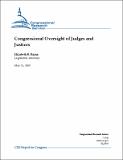|
Reseña:
|
This report addresses Congress’s oversight authority over individual federal judges or SupremeCourt Justices. Congressional oversight authority, although broad, is limited to subjects related tothe exercise of legitimate congressional power. While Congress has the power to regulate thestructure, administration and jurisdiction of the courts, its power over the judicial acts ofindividual judges or Justices is more restricted. For instance, Congress has limited authority toremove or discipline a judge for decisions made on the bench. Article III, Section 1 of theConstitution provides that judges have “good behavior” tenure, which effectively has come tomean lifetime tenure for Article III judges subject to removal only through conviction onimpeachment. However, impeachment of a judge or Justice requires a finding that such judge orJustice has engaged in a “High Crime or Misdemeanor.” Thus, an investigation into decisions orother actions by a particular judge pursuant to an impeachment would appear to require someconnection between an alleged “High Crime or Misdemeanor” and a particular case or cases.Of course, review and consideration of particular court decisions or other judicial acts are wellwithin the purview of Congress’s legislative authority. For instance, Congress has the legislativeauthority to amend statutes that it believes were misinterpreted by court cases, or to proposeamendments to the Constitution that it believes would rectify erroneous constitutional decisions.However, investigating the judge or Justices behind such decisions may require something more.This report reviews a number of circumstances in which Congress may be authorized to eitherpursue or otherwise influence an investigation of individual federal judges or Supreme CourtJustices.First the report addresses the general powers and limitations on Congress’s oversight authority.Second, the report examines the Senate approval process for the nominations of individual judgesor Justices, and the Senate’s ability to obtain information on judges or Justices during thatprocess. The report also considers the limits of existing statutory authority for judicial disciplineand how Congress has influenced such procedures. It discusses the issue of how far thecongressional investigatory powers can be exercised regarding possible judicial impeachments.Finally, it treats investigations regarding the individual actions of a judge outside of the abovecontexts, such as how a judge imposes sentences under the United States Sentencing Guidelines.A separate report, CRS Report RL32926, Congressional Authority Over the Federal Courts, byElizabeth B. Bazan, Kenneth R. Thomas, and Johnny H. Killian, addresses Congress’s legislativeauthority over the courts.This report addresses Congress’s oversight authority over individual federal judges or SupremeCourt Justices. Congressional oversight authority, although broad, is limited to subjects related tothe exercise of legitimate congressional power. While Congress has the power to regulate thestructure, administration and jurisdiction of the courts, its power over the judicial acts ofindividual judges or Justices is more restricted. For instance, Congress has limited authority toremove or discipline a judge for decisions made on the bench. Article III, Section 1 of theConstitution provides that judges have “good behavior” tenure, which effectively has come tomean lifetime tenure for Article III judges subject to removal only through conviction onimpeachment. However, impeachment of a judge or Justice requires a finding that such judge orJustice has engaged in a “High Crime or Misdemeanor.” Thus, an investigation into decisions orother actions by a particular judge pursuant to an impeachment would appear to require someconnection between an alleged “High Crime or Misdemeanor” and a particular case or cases. Of course, review and consideration of particular court decisions or other judicial acts are wellwithin the purview of Congress’s legislative authority. For instance, Congress has the legislativeauthority to amend statutes that it believes were misinterpreted by court cases, or to proposeamendments to the Constitution that it believes would rectify erroneous constitutional decisions.However, investigating the judge or Justices behind such decisions may require something more.This report reviews a number of circumstances in which Congress may be authorized to eitherpursue or otherwise influence an investigation of individual federal judges or Supreme CourtJustices. First the report addresses the general powers and limitations on Congress’s oversight authority. Second, the report examines the Senate approval process for the nominations of individual judgesor Justices, and the Senate’s ability to obtain information on judges or Justices during thatprocess. The report also considers the limits of existing statutory authority for judicial disciplineand how Congress has influenced such procedures. It discusses the issue of how far thecongressional investigatory powers can be exercised regarding possible judicial impeachments.Finally, it treats investigations regarding the individual actions of a judge outside of the abovecontexts, such as how a judge imposes sentences under the United States Sentencing Guidelines.A separate report, CRS Report RL32926, Congressional Authority Over the Federal Courts, byElizabeth B. Bazan, Kenneth R. Thomas, and Johnny H. Killian, addresses Congress’s legislativeauthority over the courts. |

